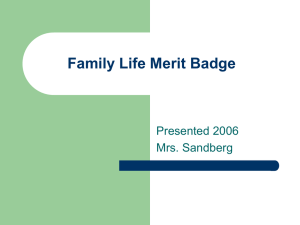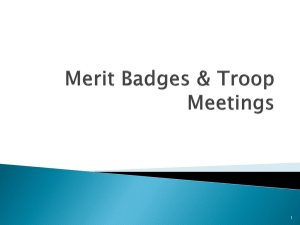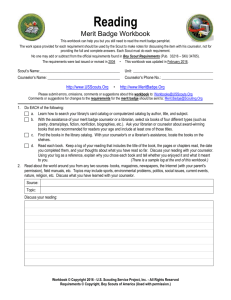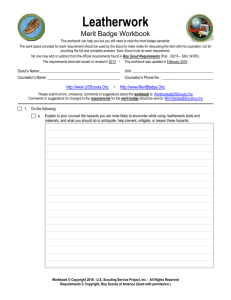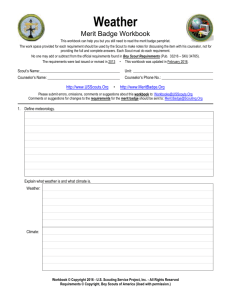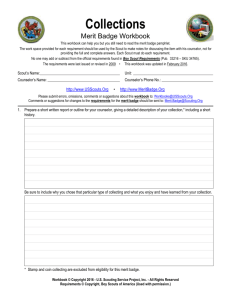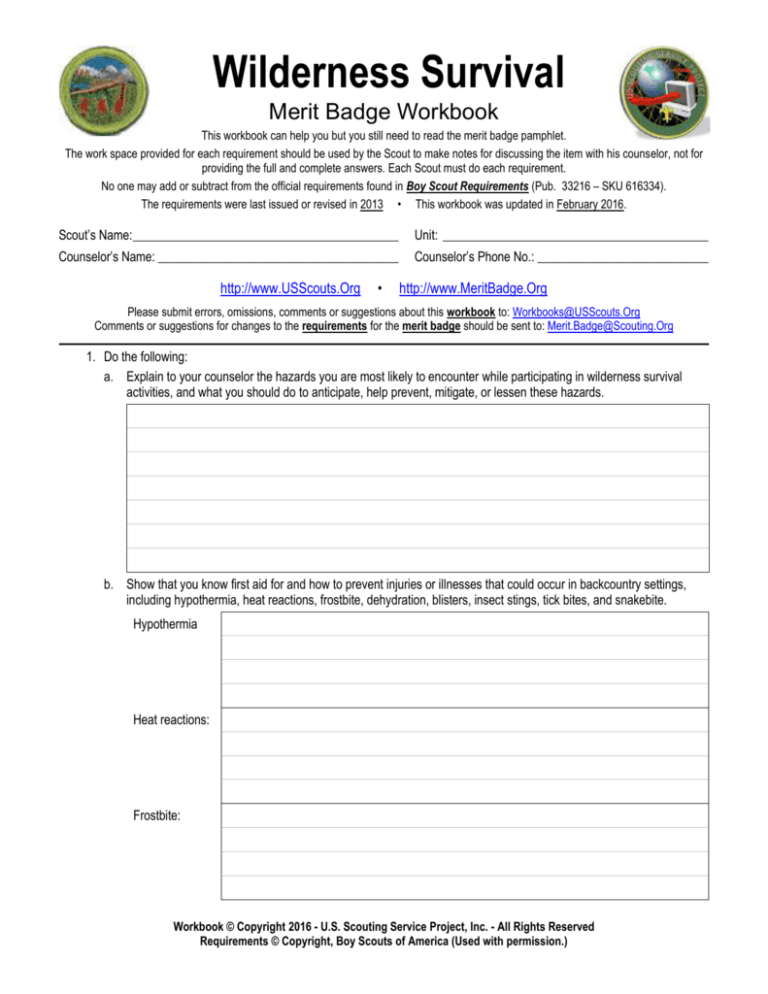
Wilderness Survival
Merit Badge Workbook
This workbook can help you but you still need to read the merit badge pamphlet.
The work space provided for each requirement should be used by the Scout to make notes for discussing the item with his counselor, not for
providing the full and complete answers. Each Scout must do each requirement.
No one may add or subtract from the official requirements found in Boy Scout Requirements (Pub. 33216 – SKU 616334).
The requirements were last issued or revised in 2013 • This workbook was updated in February 2016.
Scout’s Name:__________________________________________
Unit: __________________________________________
Counselor’s Name: ______________________________________
Counselor’s Phone No.: ___________________________
http://www.USScouts.Org
•
http://www.MeritBadge.Org
Please submit errors, omissions, comments or suggestions about this workbook to: Workbooks@USScouts.Org
Comments or suggestions for changes to the requirements for the merit badge should be sent to: Merit.Badge@Scouting.Org
______________________________________________________________________________________________________________________________________________
1. Do the following:
a. Explain to your counselor the hazards you are most likely to encounter while participating in wilderness survival
activities, and what you should do to anticipate, help prevent, mitigate, or lessen these hazards.
b. Show that you know first aid for and how to prevent injuries or illnesses that could occur in backcountry settings,
including hypothermia, heat reactions, frostbite, dehydration, blisters, insect stings, tick bites, and snakebite.
Hypothermia
Heat reactions:
Frostbite:
Workbook © Copyright 2016 - U.S. Scouting Service Project, Inc. - All Rights Reserved
Requirements © Copyright, Boy Scouts of America (Used with permission.)
Wilderness Survival
Scout's Name: ________________________
Dehydration:
Blisters:
Insect stings:
Tick bites:
Snakebite.
2. From memory, list the seven priorities for survival in a backcountry or wilderness location. Explain the importance of
each one with your counselor. (The space provided here is for you to write out the priorities to help you memorize them.)
1.
2.
3.
Wilderness Survival - Merit Badge Workbook
Page. 2 of 8
Wilderness Survival
Scout's Name: ________________________
4.
5.
6.
7.
3. Discuss ways to avoid panic and maintain a high level of morale when lost, and explain why this is important.
4. Describe the steps you would take to survive in the following conditions:
a.
Cold and Snowy
b.
Wet (forest)
Wilderness Survival - Merit Badge Workbook
Page. 3 of 8
Wilderness Survival
c.
Hot and Dry (desert)
d.
Windy (mountains or plains)
e.
Water (ocean, lake, or river)
Scout's Name: ________________________
5. Put together a personal survival kit and explain how each item in it could be useful.
Wilderness Survival - Merit Badge Workbook
Page. 4 of 8
Wilderness Survival
Scout's Name: ________________________
6. Using three different methods (other than matches), build and light three fires.
1.
2.
3.
7. Do the following:
a. Show five different ways to attract attention when lost.
1.
2.
3.
4.
5.
b. Demonstrate how to use a signal mirror.
Wilderness Survival - Merit Badge Workbook
Page. 5 of 8
Wilderness Survival
Scout's Name: ________________________
c. Describe from memory five ground-to-air signals and tell what they mean.
(The space provided here is for you to write out the priorities to help you memorize them.)
1.
2.
3.
4.
5.
8. Improvise a natural shelter. For the purpose of this demonstration, use techniques that have little negative impact on the
environment. Spend a night in your shelter.
9. Explain how to protect yourself from insects, reptiles, and bears.
Insects:
Reptiles:
Bears:
10. Demonstrate three ways to treat water found in the outdoors to prepare it for drinking.
1.
2.
3.
Wilderness Survival - Merit Badge Workbook
Page. 6 of 8
Wilderness Survival
Scout's Name: ________________________
11. Show that you know the proper clothing to be worn in your area on an overnight in extremely hot weather and extremely
cold weather.
Extremely hot weather:
Extremely cold weather:
12. Explain why it usually is not wise to eat edible wild plants or wildlife in a wilderness survival situation.
Requirement resources can be found here:
http://www.meritbadge.org/wiki/index.php/Wilderness Survival#Requirement resources
Wilderness Survival - Merit Badge Workbook
Page. 7 of 8
Important excerpts from the Guide To Advancement - 2013, No. 33088 (SKU-618673)
[1.0.0.0] — Introduction
The current edition of the Guide to Advancement is the official source for administering advancement in all Boy Scouts of America programs: Cub
Scouting, Boy Scouting, Varsity Scouting, Venturing, and Sea Scouts. It replaces any previous BSA advancement manuals, including Advancement
Committee Policies and Procedures, Advancement and Recognition Policies and Procedures, and previous editions of the Guide to Advancement.
[Page 2, and 5.0.1.4] — Policy on Unauthorized Changes to Advancement Program
No council, committee, district, unit, or individual has the authority to add to, or subtract from, advancement requirements. There are limited
exceptions relating only to youth members with special needs. For details see section 10, “Advancement for Members With Special Needs”.
[Page 2] — The “Guide to Safe Scouting” Applies
Policies and procedures outlined in the Guide to Safe Scouting, No. 34416, apply to all BSA activities, including those related to advancement and
Eagle Scout service projects.
[7.0.3.1] — The Buddy System and Certifying Completion
A youth member must not meet one-on-one with an adult. Sessions with counselors must take place where others can view the interaction, or the
Scout must have a buddy: a friend, parent, guardian, brother, sister, or other relative—or better yet, another Scout working on the same badge—along
with him attending the session.
When the Scout meets with the counselor, he should bring any required projects. If these cannot be transported, he should present evidence, such as
photographs or adult verification. His unit leader, for example, might state that a satisfactory bridge or tower has been built for the Pioneering merit
badge, or that meals were prepared for Cooking. If there are questions that requirements were met, a counselor may confirm with adults involved.
Once satisfied, the counselor signs the blue card using the date upon which the Scout completed the requirements, or in the case of partials, initials
the individual requirements passed.
Note that from time to time, it may be appropriate for a requirement that has been met for one badge to also count for another. See “Fulfilling More
Than One Requirement With a Single Activity,” 4.2.3.6.
[7.0.3.2] — Group Instruction
It is acceptable—and sometimes desirable—for merit badges to be taught in group settings. This often occurs at camp and merit badge midways or
similar events. Interactive group discussions can support learning. The method can also be attractive to “guest experts” assisting registered and
approved counselors. Slide shows, skits, demonstrations, panels, and various other techniques can also be employed, but as any teacher can attest,
not everyone will learn all the material.
There must be attention to each individual’s projects and his fulfillment of all requirements. We must know that every Scout —actually and
personally— completed them. If, for example, a requirement uses words like “show,” “demonstrate,” or “discuss,” then every Scout must do that. It is
unacceptable to award badges on the basis of sitting in classrooms watching demonstrations, or remaining silent during discussions.
It is sometimes reported that Scouts who have received merit badges through group instructional settings have not fulfilled all the requirements. To
offer a quality merit badge program, council and district advancement committees should ensure the following are in place for all group instructional
events.
Merit badge counselors are known to be registered and approved.
Any guest experts or guest speakers, or others assisting who are not registered and approved as merit badge counselors, do not accept the
responsibilities of, or behave as, merit badge counselors, either at a group instructional event or at any other time. Their service is temporary, not
ongoing.
Counselors agree not to assume prerequisites have been completed without some level of evidence that the work has been done. Pictures and
letters from other merit badge counselors or unit leaders are the best form of prerequisite documentation when the actual work done cannot be
brought to the camp or site of the merit badge event.
There is a mechanism for unit leaders or others to report concerns to a council advancement committee on summer camp merit badge programs,
group instructional events, and any other merit badge counseling issues—especially in instances where it is believed BSA procedures are not
followed. See “Reporting Merit Badge Counseling Concerns,” 11.1.0.0.
There must be attention to each individual’s projects and his fulfillment of all requirements. We must know that every Scout—actually and
personally—completed them.
[7.0.3.3] — Partial Completions
A Scout need not pass all the requirements of one merit badge with the same counselor. It may be that due to timing or location issues, etc., he must
meet with a different counselor to finish the badge. The Application for Merit Badge has a place to record what has been finished—a “partial.” In the
center section on the reverse of the blue card, the counselor initials for each requirement passed. In the case of a partial completion, the counselor
does not retain his or her portion of the card. A subsequent counselor may choose not to accept partial work, but this should be rare. A Scout, if he
believes he is being treated unfairly, may work with his unit leader to find another counselor. An example for the use of a signed partial would be to
take it to camp as proof of prerequisites. Partials have no expiration except the Scout’s 18th birthday. Units, districts, or councils shall not establish
other expiration dates for partial merit badges.
[7.0.4.8] — Unofficial Worksheets and Learning Aids
Worksheets and other materials that may be of assistance in earning merit badges are available from a variety of places including unofficial sources
on the Internet and even troop libraries. Use of these aids is permissible as long as the materials can be correlated with the current requirements that
Scouts must fulfill. Completing “worksheets” may suffice where a requirement calls for something in writing, but this would not work for a requirement
where the Scout must discuss, tell, show, or demonstrate, etc. Note that Scouts shall not be required to use these learning aids in order to complete a
merit badge.
Attachment
(NOTE: It is not necessary to print this page.)
Page 8 of 8

